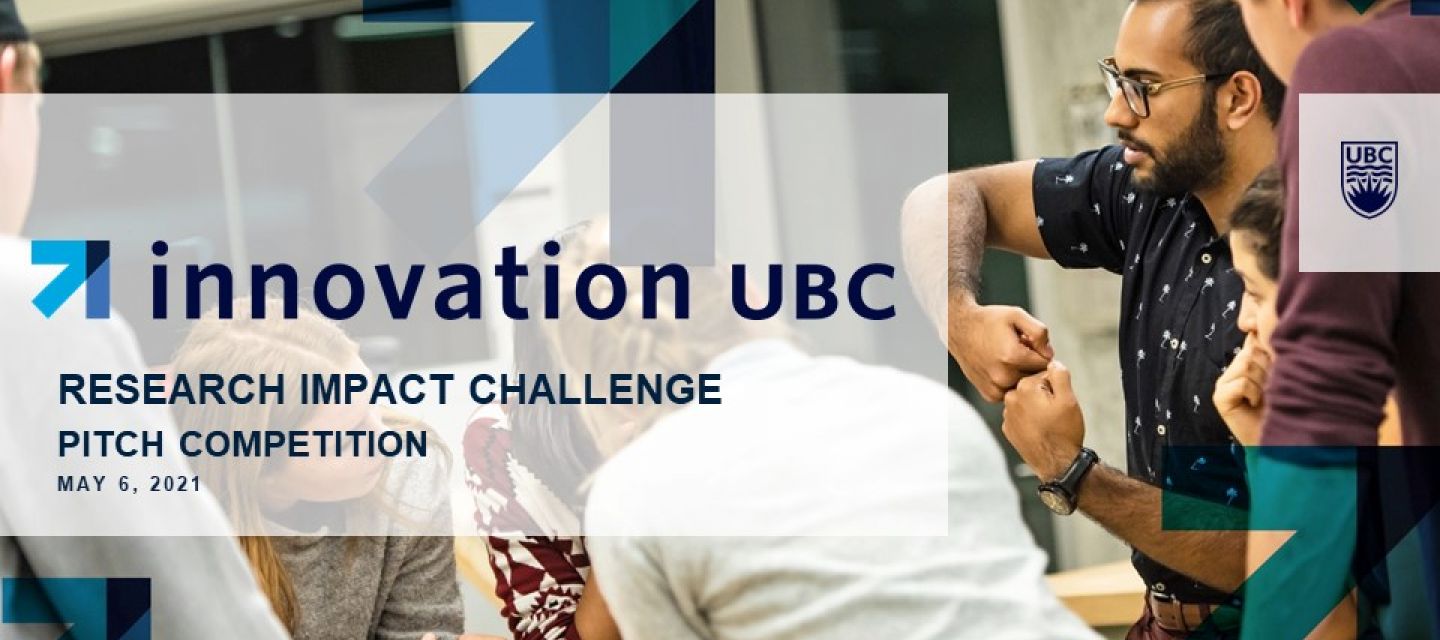A helmet technology to reduce the risk of spinal cord injuries, and non-invasive topical treatments for genetic skin conditions were the winning ideas in Innovation UBC’s 2021 Research Impact Challenge Pitch Competition.
The competition was held on Thursday May 6, 2021 with five teams pitching their ideas to a panel of judges and a live audience. The pitches marked the culmination of several months of work by the teams, who had been participating in the Innovation UBC Research Impact Challenge since February.
The competition began with a series of weekly education sessions—delving into topics such as market analysis, value propositions, commercialization, knowledge exchange and partnership building. Through presentations, breakout sessions and mini-challenges participants gained access to the support needed to develop the potential impact of their idea.
First place: Pivot
In Canada, traumatic spinal cord injuries disproportionately affect young individuals participating in sports, and can often manifest in the form of severe pain and/or paralysis. The estimated annual economic cost of new spinal cord injuries is approximately $3.6 billion. Pivot is developing a new helmet technology designed specifically to mitigate these devastating injuries.
Pivot and Nemo tied for the event's audience choice vote.
Second place: Nemo
There are over 400 rare, but severe and often stigmatizing, skin diseases that lack any treatment options. Nemo is leveraging cutting-edge gene editing and gene delivery technology to develop a topical treatment option that can be applied as simple as a cream.
Nemo and Pivot tied for the event's audience choice vote.
Other pitching projects (in alphabetical order)
Citrus
Citrus is looking to develop and utilize a smart juice machine that will press fresh lemons, then will dry, grind and encapsulate the fruit’s seeds and rind, delivering pills that will serve as a natural health supplement that could potentially alleviate the symptoms of diabetes.
Isolatrix
Isolatrix is developing a single cell isolation instrument, designed to meet the stringent experimental demands for large-scale sequencing workflows. The new platform has the potential to streamline next generation single cell sequencing experiments, enabling capabilities previously limited through either resources or cost.
Online Integrated Accessibility Platform
Fifteen per cent of the global population has some form of disability, and these numbers are increasing due to population aging and chronic conditions, especially in North America. However, many people with disabilities experience unmet needs and have difficulty accessing required services and assistive technology (AT) that can improve their function and independence in activities of daily living. A proposed online platform, will allow people with disabilities (and their families and caregivers) to easily obtain knowledge of available AT and other services in order to navigate their needs related to their disabilities.
The competition winners were announced by UBC’s Associate Vice-President of Research & Innovation Rachel Fernandez, who commented: “It was tough to make a decision, and we really tried to look at all of the pitches and what made them each stand out. There was a lot of discussion, but ultimately we felt Pivot told the most compelling story, and supported it with a really solid action plan to move their project forward. Those of you who have a research idea you’d like to explore, we really encourage you to reach out to Innovation UBC; we can help you advance your idea."
Judging panel:
- Rachel Fernandez (Associate Vice-President, Research and Innovation and Professor, Department of Microbiology and Immunology, UBC)
- George Hrsicu (Senior Innovation Advisor, Innovation Canada)
- Andre Marziali (Founder and President, Boreal Genomics, and Director, UBC Engineering Physics)
- Cynthia Shippam (Industrial Technology Advisor, NRC-CNRC National Research Council Canada, IRAP-PARI Industrial Research Assistance Program)
- Denise Withers (Entrepreneur, certified leadership coach and award-winning storyteller)
The competition was delivered by the Innovation UBC network of units: Innovation Partnerships,theUniversity Industry Liaison Office (UILO),entrepreneurship@UBCand theKnowledge Exchange Unit. Innovation UBC supports the transformation of UBC research into new technologies, services, treatments and policies through channels such as commercialization, venture building or forming new partnerships with industry, government, non-profit or community groups.
